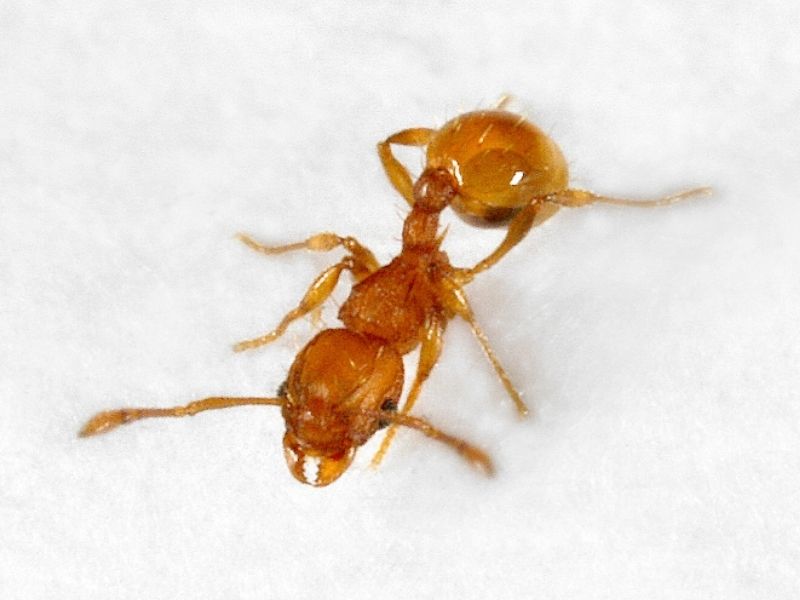Electric Ants
Electric Ants (Wasmannia auropunctata) Electric ants are a category 1 restricted matter under the Biosecurity Act 2014.
Electric ants area serious threat to our lifestyle, environment and industry.
When working in an electric ant restricted zone, you must comply with movement restrictions on materials (carries) that risk spreading electric ants.
Penalties apply for non-compliance.
Book a free a free yard check:
Report suspected electric ants online or call Biosecurity Queensland on 13 25 23.
Movement controls for electric ants in Queensland
The Biosecurity Act 2014 and the Biosecurity Regulation 2016 place obligations on people to reduce the risk of spreading electric ants.
If you live in Cairns or the surrounding regions, and your activities involve the movement of material that may harbour electric ant (electric ant carriers) you have a general biosecurity obligation to take all reasonable steps to ensure that you do not spread electric ants.
The electric ant biosecurity zone is in place in Far North Queensland in Douglas Shire.
The biosecurity zone restricts the movement of live electric ant and electric ant carriers.
Movement controls in place within the biosecurity zone are designed to prevent electric ants from spreading, and are essential to the eradication effort.
More details available HERE
Restricted zone maps:
Restrictions apply on the movement of electric ant carriers.
Visit the interactive Electric Ant Biosecurity Zone Map to check if restrictions apply to your property.
View restriction zones within the Douglas shire:
Wild Dogs and Dingoes
Wild dogs include dingoes, wild domestic dogs and hybrids.
Wild dogs are widespread in both the agricultural and natural landscape. They
also frequently exist on the outskirts of towns and even within urban areas.
Understanding Dingoes and Protecting Our Community
Dingoes, native to Australia, are an integral part of our ecosystem. However, it’s essential to recognize their presence in the Douglas Shire area and take appropriate measures to ensure the safety of both humans and these wild animals. Council’s biosecurity officers generally do not interfere with dingo populations unless the animals are being a pest on private or council-controlled lands. Council’s trained staff respond to individual issues as they arise on a case-by-case basis and will respond when reported behaviour such as threatening the safety of the public, predating on domestic pets and/or livestock is apparent. If required, officers would seek advice from biosecurity officers in the Queensland Department of Agriculture and Fisheries, or wildlife officers from the Department of Environment and Science. Dingos are generally not aggressive to people however they may display threatening behaviour in urban areas such as attacking domestic dogs, scavenging or stalking. Domestic pets and poultry are best protected by dog mesh fencing. Fencing also restrains your domestic animals and may assist in preventing other animals such as wallabies or pigs entering your property.
Do Not Feed Dingoes:
Feeding dingoes may seem harmless, but it can lead to dangerous consequences. When dingoes become accustomed to human food, they lose their natural hunting instincts and may become more aggressive in seeking out food from humans. This behaviour poses risks to both residents and visitors.
Laws and Regulations:
The dingo (Canis familiaris ) is protected in Queensland national parks as a native species. The Queensland Parks and Wildlife Service has a legal responsibility to conserve these populations on national parks and protected areas. Outside of these areas under the Biosecurity Act 2015, dingoes are categorized as restricted invasive animals. It is illegal to feed, move, keep, sell, or release dingoes into the environment. Douglas Shire Council and landholders have a responsibility to minimize biosecurity risks associated with invasive animals, including dingoes, under their control.
What to Do if You Encounter a Dingo:
Be dingo-safe!
If you encounter a dingo in the Douglas Shire area, it’s crucial to remain calm and follow these guidelines:
- Do not approach or feed the dingo: Keep a safe distance and do not attempt to interact with the animal.
- Report the sighting: Inform local authorities or the Douglas Shire Council’s Biosecurity Team about the dingo sighting. They can provide guidance and assistance if necessary.
- Follow safety precautions: If you feel threatened by a dingo, keep your arms close to your body, slowly back away while maintaining eye contact. Do not turn your back on the animal or run. Stand up to your full height or if in pairs or a group, stand back-to-back.
Community Responsibility:
Residents from the affected area can limit their interaction with Dingo’s by ensuring that there are no food sources left around that may attract them such as food scraps in bins and making sure all food sources are locked away.
As members of the Douglas Shire community, we all play a role in ensuring the safety of both humans and wildlife. By respecting laws and regulations regarding dingoes and practicing responsible behaviour, we can create a safer environment for everyone.

Feral Pigs
Feral pigs (Sus scrofa) are a major pest animal in the Wet Tropics area of far north Queensland. Pigs damage the natural environment and pose a major threat to the conservation values of the Wet Tropics World Heritage area. They cause significant losses to agricultural enterprises in the region, and harbour and spread diseases affecting native animals, stock and humans.


